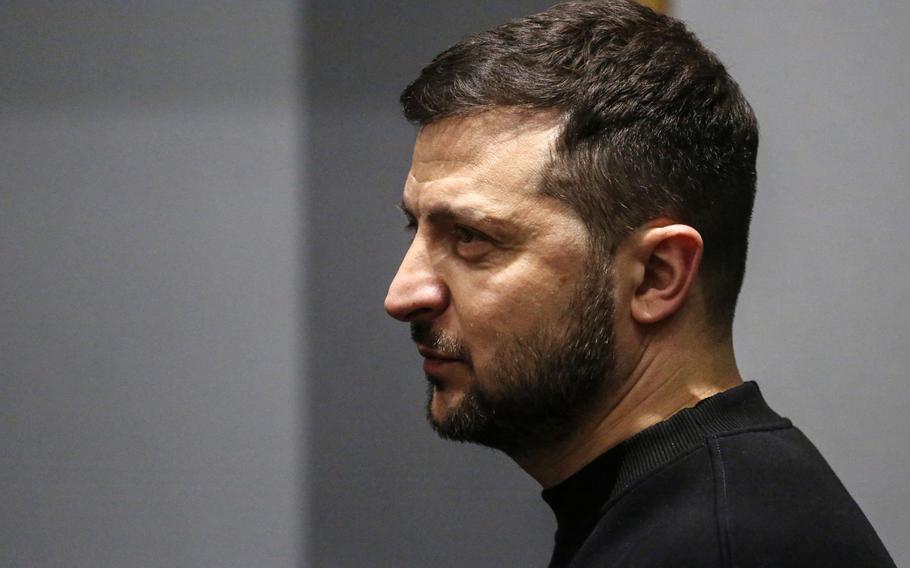
Ukraine President Volodymyr Zelenskyy. (Valeria Mongelli/Bloomberg)
The European Union is poised to force banks to report information on Russian Central Bank assets as part of the bloc’s latest sanctions package targeting Moscow for its war in Ukraine, according to draft proposals seen by Bloomberg.
Getting a handle on the scale of central bank and other sanctioned state-backed assets that have been immobilized in the E.U. is seen as a first step to exploring options to potentially using those funds to contribute to Ukraine’s reconstruction.
“We need to know where these are located and how much they are worth,” Commission President Ursula von der Leyen said in a video statement Wednesday.
The European Commission, the bloc’s executive arm, also proposed strengthening the reporting obligations on frozen assets linked to sanctioned Russian companies and individuals, and suggested fines — of as much as €50,000 for individuals and 10% of annual turnover for entities — to be imposed for failure to provide the required information, the documents say.
Von der Leyen said that the E.U.’s new sanctions package would target €11 billion worth of goods via trade bans and technology controls.
“We propose, among other things export restrictions on multiple electronic components used in Russian armed systems — such as drones, missiles, helicopters,” she told the European Parliament. She said the bloc will also sanction seven Iranian entities, including those linked to Iran’s Revolutionary Guard, as it seeks to halt Tehran’s provision of drones to Russia.
The E.U. is aiming to adopt its 10th package of sanctions next week ahead of the one-year mark of the Russian invasion. European leaders have also sought to boost support for Kyiv — through weapons pledges and meetings with Ukrainian President Volodymyr Zelenskyy — before renewed offensives in the coming weeks.
The latest suite of measures would also introduce extensive trade restrictions on goods used by Russia’s military, including technologies, components, heavy vehicles, electronics, and rare-earths.
“With this, we have banned all tech products found on the battlefield and we will make sure they don’t find other ways to get there,” von der Leyen said.
The bloc is also proposing a ban on goods from transiting through Russia to lower the risk of sanctions being breached and to introduce import restrictions into the E.U. of Russian rubber and asphalt. Von der Leyen added that the E.U. will organize a Sanctions Coordinators Forum next week, along with international partners, to strengthen efforts to enforce restrictions on Russia.
The E.U. is also looking to sanction dozens of individuals and entities, including politicians and military personnel, as well as:
—Alfa Bank, Rosbank and Tinkoff Bank JSC, as well as the National Wealth Fund of the Russian Federation;
—Media groups that have engaged in propaganda in support of aggression against Ukraine;
—A Russian reinsurer of ships exporting Russian oil;
—A U.K.-registered shipping company accused of using its vessels to transport stolen Ukrainian grain on behalf of Russia.
The reinsurance company is controlled by the Bank of Russia, which since the war has more than tripled the capital available to the firm to 300 billion rubles ($4.1 billion), according to one of the drafts. In turn, the reinsurance firm provides services and guarantees to a Russian insurance company that the E.U. is also looking to sanction. The insurance and reinsurance are being used by Russian ships and cargoes to redirect their oil to countries such as India after European firms withdrew their services, one of the documents says.
The proposed measures will be discussed by member states this week and may change before the package is approved. E.U. sanctions need the backing of all member states to be adopted.
Other proposals include an extension of the suspension of the broadcasting licenses of media outlets controlled by the Russian state and which are accused of spreading propaganda, and manipulating and distorting facts, targeting the E.U. and its neighbors.
The E.U. also wants to restrict Russian nationals from holding posts in the governing bodies of the operators of critical European infrastructures and entities, according to the documents. E.U. citizens would be exempt from the provision.
Similarly, the package of sanctions, if approved, would prohibit providing gas storage capacity to Russian nationals and residents, as well as entities established in Russia.
The E.U.’s sanctions are finally starting to make a real impact on Russia’s economy, limiting its revenues and constraining its trade, the bloc’s foreign policy chief, Josep Borrell, told the European Parliament on Wednesday.
“The sanctions are a slow-action poison, a little bit like arsenic,” he said. “It takes time to take an effect.”
Bloomberg’s Katharina Rosskopf contributed to this report.